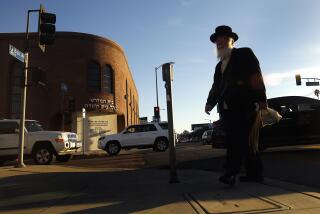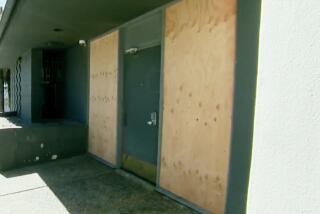Taking Steps to Stop Hate Crimes
SACRAMENTO — With a flurry of hate-fueled attacks hitting California, from arson fires at three Sacramento area synagogues to the rampage last week at a Jewish community center in Granada Hills, religious and law enforcement leaders met Thursday to discuss ways to beef up security at our most vulnerable institutions.
They talked of precautions against pipe bombs, surveillance cameras in synagogues and churches, the foibles of white supremacists and the best ways to angle security lights.
More than 100 in attendance listened intently, but no one liked what they heard.
“I hated it,” said Rabbi Marvin Schwab of Temple Or Rischon in Granite Bay, a Sacramento suburb. “These are things I would rather not have to deal with. But I think we may have saved lives with what we learned today.”
The half-day conference sponsored by the Anti-Defamation League is one of four being held in Northern California. Plans are also in the works for security sessions in Los Angeles in response to the arrest of Buford O. Furrow Jr., the man accused of wounding five people at the North Valley Jewish Community Center and then killing a Filipino American postal carrier.
Those attacks were just the latest in a string of hate crimes that have rocked the nation. “This,” said Jonathan Bernstein, the ADL’s regional director, “has been a very difficult year for us.”
James Maddock, the FBI special agent leading the investigation of the synagogue fires, told participants in the security conference that law enforcement is at best “a Band-Aid” for such crimes, which can seemingly be instigated from any direction. The ultimate solution, he said, is education of children at an early age to create a more tolerant society.
Federal authorities are growing increasingly worried that hatemongers will use Y2K furor and the belief that the end of the millennium represents “the end times” as an excuse to assault Jews, minorities and homosexuals. Fueled by Internet propaganda, the movement has increasingly taken the form of a leaderless resistance, with individuals or small groups of two or three waging a campaign of hate.
In the meantime, an increase in vigilance is needed, participants at the security conference said. And police offered tips to that end.
One expert talked of trimming trees and bushes so attackers have no easy hiding places, and of installing motion-detection lights and alarms. Sacramento County’s fire marshal stressed the need for sprinkler systems to help quell the flames if an arsonist strikes. A bomb expert talked of precautionary measures, such as holding classes so employees know how to react, and looking for the telltale signs of a mail bomb: excessive postage or taping, odd lumps, misspelled names or no return address.
“This isn’t Israel. This isn’t Ireland,” said Mike Garner, a Sacramento police bomb technician. “But a little bit of paranoia is healthy.”
And understandable. Hate incidents have made headlines this summer, beginning with the June 18 torching of the three Sacramento area synagogues. The prime suspects are two brothers heavily influenced by a white supremacist religion. Although no charges have been brought in connection with the fires, the brothers have been indicted in the July 1 murder of a Redding gay couple.
Over the Fourth of July weekend, a gunman with ties to the white supremacist World Church of the Creator went on a shooting rampage that left two dead and nine injured in Illinois and Indiana. The gunman killed himself as police closed in.
On Thursday, Rabbi Matt Friedman listened carefully as the conference wore on. His synagogue, Congregation Beth Shalom, was one of the three damaged in the arson attacks. He called the need for heightened security “a sad reality,” but noted that the fires had brought the Sacramento community together like never before.
And, he lamented, such attacks “are not really a new thing. We’ve dealt with this in one form or another for a long time--like 3,000 years.”
* FURROW INDICTED
Buford Furrow, accused in Jewish center shootings, will first face federal murder charges. B1
More to Read
Sign up for Essential California
The most important California stories and recommendations in your inbox every morning.
You may occasionally receive promotional content from the Los Angeles Times.










